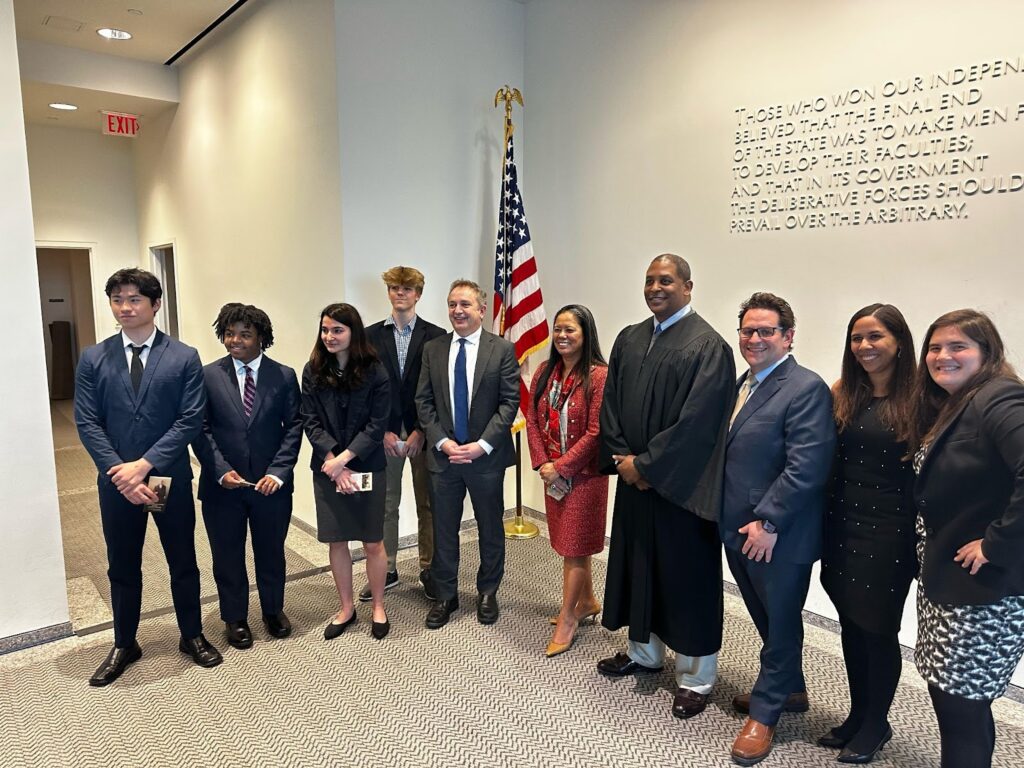Sponsored by the Federal Bar Association, the Annual Bill of Rights contest urges students to dive deep into the history and meaning of the first Ten Amendments.
This year’s contest challenged students to suggest what amendment they would add to the Constitution. The contest received close to 50 student essays advocating for innovative amendments.
First Circuit Appeal Court Chief Judge David Barron and U.S. District Court judges played major roles in The Annual Bill of Rights Contest celebration, from reading student essays to giving live feedback to the winners. Some of the proposed amendments protected guaranteed housing for all, protection of student privacy, and the right to an education.
The contest was open to students from Boston, Worcester, and Springfield. The first-place prize winner Daphne Athanasopoulos, from Boston Latin High School, was awarded $500, the second-place prize winner Adam Whitney, from Boston Latin High School, received $300, and the third-place prize winner Phat Do, from Boston Latin High School, received $200. There were cash prizes for honorable mentions as well.

2023 Federal Bar Association Bill of Rights Essay Contest Winning Essay by Daphne Athanasopoulos

Is there a right to privacy in the Constitution, despite it never being explicitly stated? Justice Louis Brandeis said that the Constitution protects Americans “in their beliefs, their thoughts, their emotions, and their sensations” and “conferred, as against the government, the right to be let alone – the most comprehensive of rights and the right most valued by civilized men.” He recognized that the concept of privacy existed in our Constitution, even though it was never mentioned. I agree with Louis Brandeis in that there is no freedom without privacy. I would add an explicit amendment to the Bill of Rights protecting this foundational right.
What would a world without privacy be like? I along with thousands of other American ninth graders confront such a world in George Orwell’s dystopian novel 1984. Orwell showed us that a world without privacy is a world without freedom. The citizens are completely controlled because they are constantly being watched and lose all dignity. There is nowhere to hide: “Winston kept his back turned to the telescreen. It was safer, though, as he well knew, even a back can be revealing.” 1984 is a fantasy – or is it prescient? I can’t help but think that the surveillance state’s telescreens watching Winston resemble my Alexa listening to me from the kitchen. In our world, the surveillance states of Russia and China use technology to monitor and repress their populations, while corporations in the U.S. trade our personal data for profit. When it comes to the protection of our digital privacy, we are closer to this hellish reality than we realize.
The right to privacy is implicit in our Constitution. For example, the Fourth Amendment protects “persons, houses, papers, and effects” from unreasonable searches and seizures. However, the papers and effects of today not only include physical objects but the digital information that we are unknowingly making public. How much of our personal information do we really own? Once our information enters the cloud, there is no way to know how many people can now access it. Even the websites we browse monitor our behavior. Our devices are constantly tracking us in what we read, where we go, and what we buy. My fellow classmates, myself included, use “free” social media apps but pay for them with our personal data. Under the European Union Data Protection Law, personal data is not considered a commodity. Our information should be similarly protected and not subject to the algorithm that defines us.
In 1928, Justice Brandeis was concerned about wiretapping, which he compared to “opening a sealed letter.” He saw no difference between the electronic transmission of personal information and physical property. He thereby realized the threat that emerging technology posed on privacy and fundamental liberty. Privacy is imperative for maintaining human dignity and is a necessary condition for individuality. Article 8 of the EU’s Charter on Fundamental Rights protects personal data as a fundamental right. To guarantee our freedom, the U.S. The Constitution must make explicit what is already implicit and protect our liberty by protecting our privacy.
